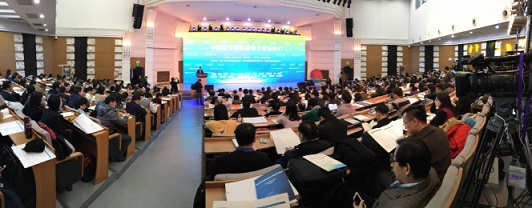By Li Shouen, CCTV.com commentator
In the conference Chinese Think Tanks Gobal Influence 2017 held in Beijing on Jan. 9, participating experts called for more robust think tanks here in the country to enhance interactions and cooperation with the world.

Chinese Think Tanks Gobal Influence 2017 conference held in Beijing on Jan. 9 [Photo/Internet]
Meanwhile, an evaluation report on Chinese think tanks’ global influence was also released. Based on the research and analysis on the performance in their numbers of foreign experts, overseas branches, international exchanges and conferences, websites and periodicals in foreign languages, and also search clicks in Google, the report graded the 61 think tanks, which are selected as their research objects into three categories.
Development Research Center of China’s State Coucil, China Center for International Economics Exchange, Chongyang Institute for Financial Studies, and several institutes of Chinese Academy of Social Sciences rank among the top lists.
China has grown rapidly in influence and ability to act in the international arena in the last three decades. It is widely believed that although China's hard power has increased tremendously during this period, China's soft power remains very limited. Therefore, there is a growing need for more high-quality think tanks, which can offer solutions, generate new ideas and enhance China's soft power by mining the wisdom in broader society.
Therefore, in 2014, at the sixth meeting of the Leading Group for Overall Reform, President Xi Jinping called for strengthening the construction of a new type of think tank with Chinese characteristics to cater for China’s need to modernize its governance and boost its global soft power.
China's think tanks, which received little exposure in the past, have hence boomed and enjoyed significant attention from the international media and policy makers, while boasting a large leap in their development. Many new types of think tanks have also sprung up.
According to the 2015 Global Go To Think Tanks Report released by the University of Pennsylvania, the United States had the most think tanks around the world, with 1,830, China was second with 429 and Britain finished third with 287.
This is something worth celebrating. Although China has a long tradition that its ancient rulers would consult with trusted advisers before making significant decisions, China's think tanks in a modern sense have emerged after reform and opening-up in 1978, and only after 2010 that the various research institutions in China started calling themselves think tanks.
But this ranking does not mean the country's think tanks are among the world's best. According to relevant data analysis, the websites of the majority of Chinese think tanks have not established much international influence. They still have a long way to go before they can become more influential on the global stage.
Previously, most think tanks were just affiliations to government departments, a series of problems existed: lack of competitive mechanism, weak public relations awareness, unbalanced development of different types of think tanks, slow response to new technology, including the Internet, social media, and etc.
The vast majority of think tanks in China need to be transformed. To creatively develop a new type of think tank with Chinese characteristics, the country should combine Western experiences and contemporary theories with its present national conditions and historical traditions. To become a real mechanism that influences policy-making, think tanks have to provide answers to big societal problems, and solutions must be independent, professional, enforceable and constructive.
Then, how?
As knowledge-intensive bodies, talents with professional, specialized and innovative thinking are the core competitiveness of think tanks. So, they should improve ability of their talents at different levels: for the leadership level, they should focus on political wisdom, the ability to follow policies and make proper decisions.
For research-focused talents, on one hand, think tanks should open its doors to welcome more foreigners, from both the developed nations and other nations; on the other hand, scholars, experts and researchers should focus more on their own academic fields, following the professional standards with a global perspective.
China’s think tanks could learn the modern corporate management system, which is widely-applied in the US and other Western countries, where researchers play the core role while the administration plays a supporting role. Besides, a mechanism should also be created to promote the smooth flow between think tank personnel and incumbent government officials.
China’s think tanks should strive to play a bigger role in the international arena, either participating in international conferences, forums and seminars held by other nations, or organizing such events by themselves and inviting foreign participants from various walks of life to attend, or even “going out” to host similar activities in other nations.
Last but not least, China's think tanks should keep pace with fast developing trends in new technology and upgrade their online and new media presence to generate domestic and global influence.
Winning prestige in the world will take time. China has become a more important global player and is participating in reshaping the world order. This means it faces bigger, tougher and ever more urgent challenges. Transforming its think tanks to meet these tasks is a crucial urge of the time, and a critical building block, not only for China’s future, but for the world as a whole.
China’s construction of its new type of think tanks is on the road and in the correct direction.
( The opinions expressed here do not necessarily reflect the opinions of Panview or CCTV.com. )

Panview offers a new window of understanding the world as well as China through the views, opinions, and analysis of experts. We also welcome outside submissions, so feel free to send in your own editorials to "globalopinion@vip.cntv.cn" for consideration.















